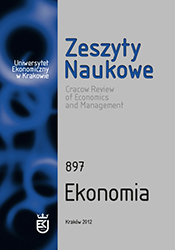Otwarta metoda koordynacji jako alternatywa dla harmonizacji polityki w Unii Europejskiej – po dekadzie od wdrożenia
The Open Method of Coordination as an Alternative to Policy Harmonisation in the European Union – a Decade after Implementation
Author(s): Adrian SolekSubject(s): Economy
Published by: Wydawnictwo Uniwersytetu Ekonomicznego w Krakowie
Keywords: Open Method of Coordination; European Union; Lisbon strategy; economic policy
Summary/Abstract: The Open Method of Coordination (OMC), introduced to achieve the objectives of the Lisbon Strategy, is a soft law mechanism, supplementary to the legally binding and sanctions-oriented harmonisation of EU members’ policies. The purpose of this paper is to analyse the implementation of the OMC as a decentralised and voluntarily adopted method, assess its effectiveness and outline the prospects for its future. The method is based largely on mutual observation and the comparison of solutions applied in member states as well as the transfer of best practices. OMC was supposed to be an instrument free from the problems associated with hard law instruments – such as the crisis of legitimacy or the reluctance of member states to limit their own competence in economic and social policy – and to respect specific national solutions of EU countries. Despite advantages such as flexibility, openness, responsiveness to changes in the environment, transparency, and attenuated political resistance in the member countries, the method is not free from controversy. Its main drawback is the poor performance resulting primarily from the inability to enforce the developed provisions along with excessive orientation towards quantitative criteria and competition between countries (“economisation” accompanied by the neglect of social issues). Despite the failure of the Lisbon Strategy, the OMC will be applied to an even greater extent in the next strategy – Europe 2020. Its effectiveness will depend, however, on the correction of some of its mechanisms – for example, the introduction of financial incentives or increased participation of various stakeholder groups.
Journal: Zeszyty Naukowe Uniwersytetu Ekonomicznego w Krakowie
- Issue Year: 897/2012
- Issue No: 21
- Page Range: 89-102
- Page Count: 14
- Language: Polish

